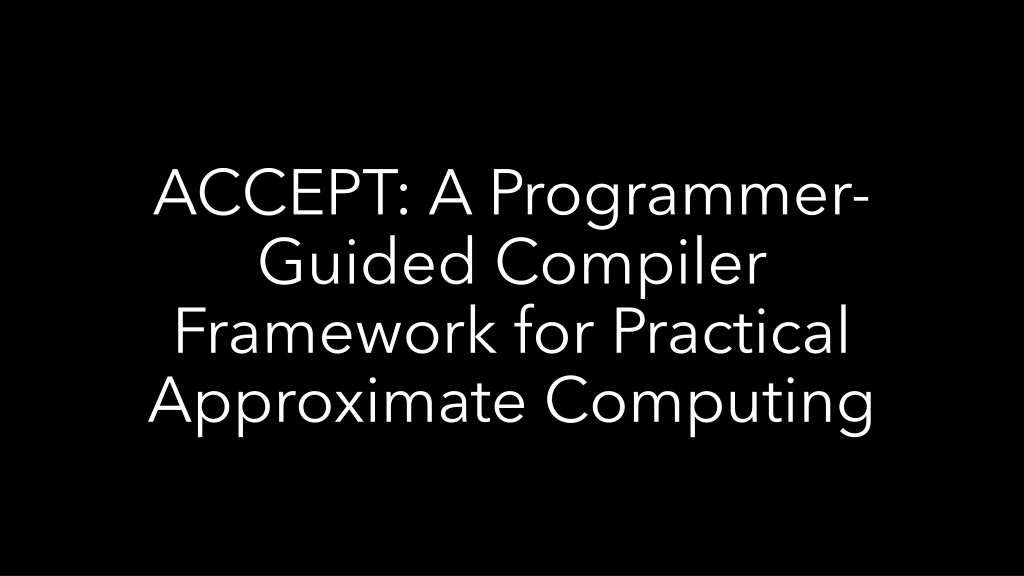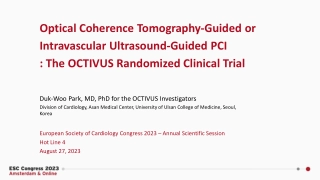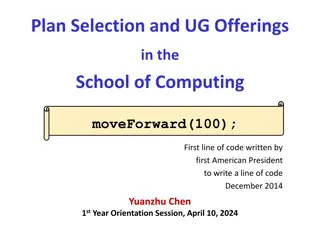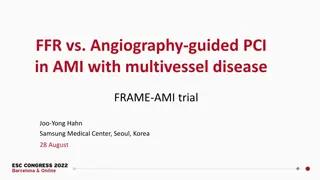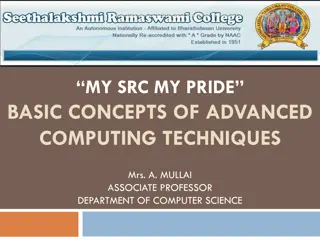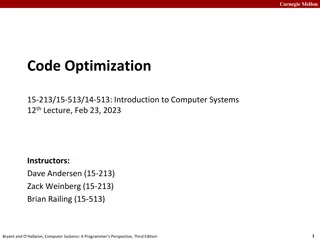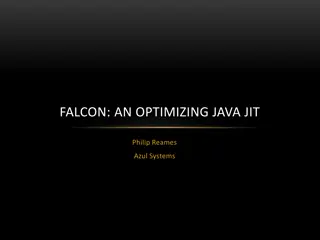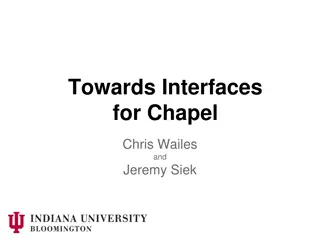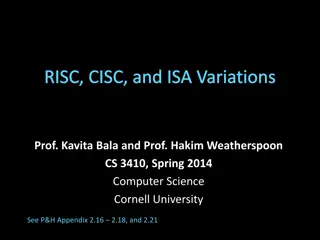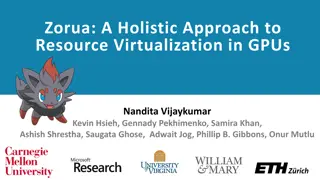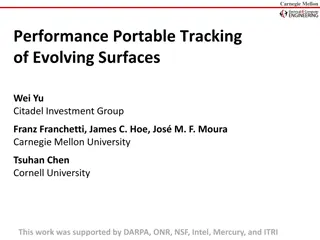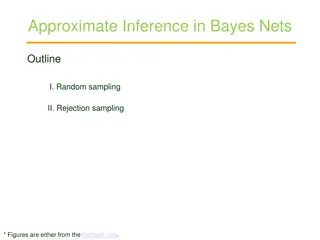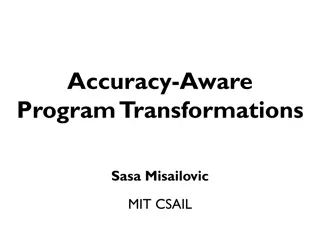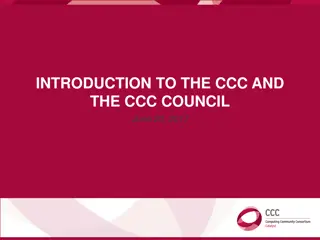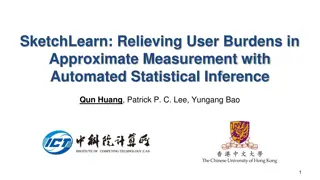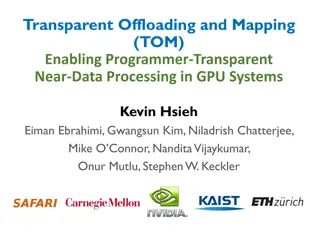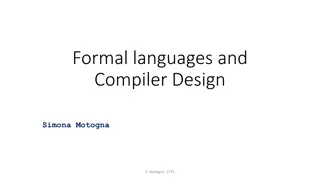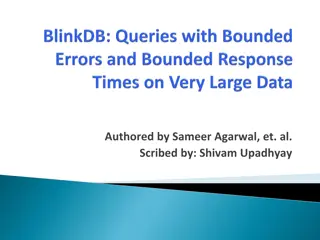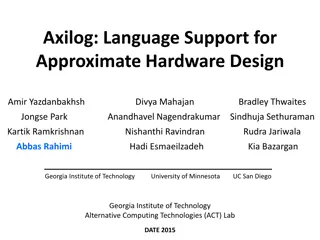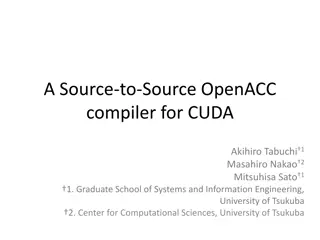ACCEPT: A Programmer-Guided Compiler Framework for Practical Approximate Computing
"ACCEPT is an Approximate C Compiler framework that allows programmers to designate which parts of the code can be approximated for energy and performance trade-offs. It automatically determines the best approximation parameters, identifies safe approximation areas, and can utilize FPGA for hardware acceleration. Programmers can mark data types as approximate or precise, receive suggestions for approximations, and have control over approximation methods. The language in ACCEPT controls information flow and endorsement to prevent conflicts between approximate and precise data."
Download Presentation

Please find below an Image/Link to download the presentation.
The content on the website is provided AS IS for your information and personal use only. It may not be sold, licensed, or shared on other websites without obtaining consent from the author. Download presentation by click this link. If you encounter any issues during the download, it is possible that the publisher has removed the file from their server.
E N D
Presentation Transcript
ACCEPT: A Programmer- Guided Compiler Framework for Practical Approximate Computing
What is ACCEPT? Approximate C Compiler for Energy and Performance Trade- offs ACCEPT is a framework for approximation that is built on top of the LLVM compiler for C/C++ code.
What is ACCEPT? Allows programmers to designate what can be approximated. Automatically determines the best approximation parameters. Identifies where safe approximation can be performed. Can utilize an FPGA for hardware acceleration.
How is ACCEPT used? Programmers can mark data types as approximate or precise using keywords in code. Suggestions output to the log identify approximations to the programmer. Identifies regions of code that cannot be safely approximated in the log.
How is ACCEPT used? Can be approximated: loop at streamcluster.cpp:651 can perforate loop Cannot be approximated: loop at streamcluster.cpp:651 blockers: 1 * streamcluster.cpp:652: store to myhiz 650 651 652 653 654 double myhiz = 0; for (long kk=k1; kk<k2; kk++) { myhiz += dist(points->p[kk], points->p[0], ptDimension) * points->p[kk].weight; }
How is ACCEPT used? Identified regions of code that are safe to approximate are tested with 3 approximation methods, and automatically generated configurations of those methods. Candidate approximations are tested and measured against programmer provided inputs and tolerances.
ACCEPTs Language Information flow and endorsement: ACCEPT prevents approximate data from interfering with precise data by default, by using the APPROX and ENDORSE keywords a programmer can explicitly override this behavior. Implicit flow ACCEPT prohibits approximate variables from being used in conditions (if, for, do, while, and switch). A programmer can override this with the ENDORSE keyword. Escape hatches A programmer can have manual control of ACCEPT using the ACCEPT_PERMIT and ACCEPT_FORBID keywords to force approximation on code, or to forbid approximation.
ACCEPTs Language The APPROX keyword is used to indicate that a variable can be approximated: APPROX int a = expensiveCall(); The ENDORSE keyword is used to cast from an approximate type to a precise: cheapChecksumPrecise(ENDORSE(a));
ACCEPTs Approximation Methods Loop Perforation Skipping of loop iterations as per a perforation factor. ACCEPT considers loop perforation given a loop is precise-pure and free of break statements. Synchronization Elision Bypassing locks (mutexes), semaphores, and barriers in parallel processes. ACCEPT requires a thread s code to be precise-pure. Neural Acceleration Approximating the behavior of a program using a neural network. ACCEPT approximates identified regions of code to offload to an FPGA and automatically offloads executions of that code to the FPGA.
ACCEPTs Safety Analysis Precise-pure regions of code: Contains no stores to precise variables that may be read outside the region. Does not call any functions that are not precise pure. Does not include an unbalanced synchronization statement (locking without unlocking or vice versa). Proves that chunks of code are cleanly separable from the rest of the program
ACCEPTs Autotuning Search ACCEPT automatically searches for and uses the best configuration of an approximation. Relies on programmer defined quality metrics to determine the best configuration. The autotuning search does not enumerate all possible configurations, instead it vets each approximation and then determines a composites of vetted approximations.
ACCEPTs Autotuning Search During the search only the approximation being tested is used in the program. If the error is above a threshold, the running time averaged over several executions is slower than the baseline, or the program crashes, the approximation is discarded. If an approximation survives, the autotuner increases the aggressiveness of the approximation.
ACCEPTs Autotuning Search After determining an approximation for each area of approximated code, the autotuner then determines combinations of those approximations to produce the program. ACCEPT assumes that error from each approximation added is linear. ACCEPT tests and selects the fastest configuration up to a specified error ceiling.
Evaluation ACCEPT was tested on three platforms: x86, ARM with integrated FPGA, and an embedded system (MSP430).
